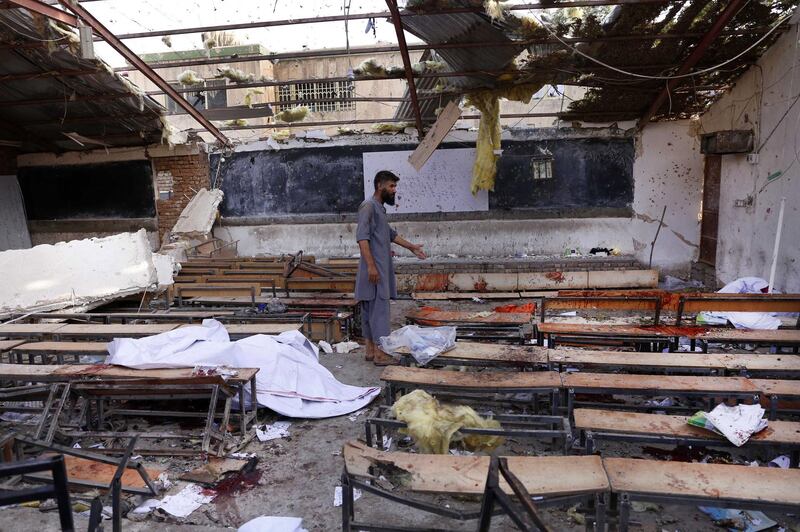A suicide bombing on Wednesday killed at least 34 people, many of them students, and left dozens more injured at a school in a Shiite area of Kabul, officials said.
A member of ISIS detonated his device in the private Mawoud educational centre in the Dasht-e-Barchi area of the Afghan capital – a largely Shia Hazara area.
Photographs showed a devastated classroom with its roof blown away. At least 15 ambulances attended the scene and local trauma hospitals were overwhelmed by the influx of students in need of emergency care.
A spokesman for Afghanistan's interior ministry said it expects the death toll to continue to climb. The health ministry said at least 67 people were injured in the attack.
The casualties were mainly students under the age of 18. Authorities initially said 48 people had been killed, but revised the number to 34 on Thursday morning.
Afghan security forces in the area responded to the blast with gunfire, assuming there were more attackers, witnesses reported.
Afghan President Ashraf Ghani condemned the suicide bombing. The strongly worded statement by President Ashraf Ghani denounced the "terrorist bombing" on Wednesday, and ordered relevant authorities to investigate how the attack happened.
Mr Ghani said that in "this terrorist bombing once again, the terrorists martyred and wounded the innocent" – students attending a training class in a Shiite neighbourhood of Kabul.
He added that "by targeting educational and cultural centres, terrorists have clearly shown they are against all those Islamic principles (that strive) for both men and women to learn and study".
The Taliban denied responsibility for the attack and condemned the incident, but the explosion comes after the group's days-long offensive on the town of Ghazni, 150 kilometres from Kabul, as well as assaults on at least two military facilities.
Jawad Ghawari, a member of the city's Shiite clerical council, blamed ISIS for the attack that carried hallmarks of previous assaults on Shiite mosques, schools, and cultural centres.
Mr Ghawari said in the past two years, there were at least 13 attacks on the Shiite community in Kabul alone.
ISIS later claimed responsibility for the act.
Last year, in a similar strike, a suicide bomber detonated an explosive device at a cultural centre also hosting students.
_______________
Read more:
[ Taliban kills dozens as it overruns second military base in Afghanistan ]
Fall of military base and battle for Ghazni exposes failures in Afghan military strategy
[ Taliban overrun Afghan military base after days of fighting ]
_______________
On Tuesday night, two Afghan military outposts were attacked, in which at least 46 security officials were killed. The night before, 17 Afghan security forces were killed when the Taliban overran a military camp in the northwest of the country.
Meanwhile, residents in the besieged city of Ghazni are starting to return to normality after a co-ordinated assault on the Taliban was repulsed by the Afghan National Army, with assistance from US and Nato air strikes.
Afghan security forces are fighting both the Taliban and ISIS in the country, with much of the emphasis in the east of the country. The Taliban are the largest group operating in Afghanistan, but ISIS has a small but potent force. The two militant groups also clash.
US and Nato forces are providing training and counterterrorism support in Operation Resolute, following the official end of their combat operation in 2014.





